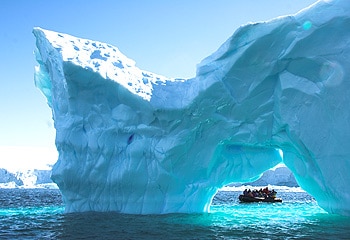Little voices in Antarctica
THE frozen continent's sheer grandeur overshadows some of its subtleties, writes James Frankham, as he discovers the lure of the little voices in Antarctica.

MUCH has been written of the raw power of Antarctica: never-ending glaciers; icebergs the size of cities; vast mountain ranges; the penetrating cold; and violent katabatic polar winds that could cut a man in half. Antarctica is all that. And more.
But sitting here in Curtis Bay, surrounded by bergs and brash ice, I'm listening to whispers.
Tiny pieces of reticulated ice crackle on the surface, there are splinters and crunches, and sounds like shotguns as icebergs split open and calve into the sea with a roar.
Then penetrating silence, as if the entire continent is poised to collapse. The little voices begin again like the respiration of a living, breathing thing, flexing and stretching its old bones under the austral summer sun.
At this time of year, the great continental bays fracture and break up, colossal floes shearing from the permanent ice and drifting out to sea as tabular bergs many nautical miles long and pan-flat on top. Antarctica slims.
Six months from now, it will grow again, building sea ice that will double the total area of the continental land mass.
Like the beating of a huge heart, the continent waxes and wanes in this annual rhythm. Salt is rejected as the water freezes, forming heavy, super-saline layers that swirl north, fuelling the Earth with nutrient-rich cold water and feeding and cooling the planet.
Ice claws at the side of the inflatable I'm sitting in like it's trying the climb over the side or sink its jagged teeth into the pontoon.
It concerns me slightly that there's only three millimetres of rubber between me and certain death in the frigid waters. After all, the Titanic was made of steel, right?
But the inflatables slither through the bergy-bits and happily nuzzle up to glaciers as we explore the bays and shattered coastline of the Antarctic Peninsula.
I have read the stories of human exploration on the white continent. The race to the pole, the prospecting for minerals; tales of daring and defeat, triumph and tragedy. Shackleton and Scott, Mawson, Amundsen and Wild.
These men and their parties endured unimaginable suffering in the biting blizzards of Antarctica.
They lost comrades and ships, and time and again committed every shred of finance at their disposal to doggedly push south.
Robert Scott and his party died trying to return from the pole, already beaten by the Norwegians.
That same year, Douglas Mawson mounted his own ill-fated expedition to prospect for minerals in wind-whipped Commonwealth Bay.
He lost a man down a crevasse, and another to the hideous perils of hypervitaminosis-A after the party ate their dogs' livers to stay alive.
Yet the Australian doggedly pushed on through 500km of ice to the safety of camp.
As World War I broke out, Ernest Shackleton and his 27 men were marooned in the ice of the Weddell Sea for an entire year, subsisting on seal blubber.
Against all odds, they rowed to safety on Elephant Island and sailed in a 7m boat across 1400km of the Southern Ocean to South Georgia.
Three of the party then climbed non-stop for 36 hours across glaciers and mountain ranges to reach a whaling station and mount an operation to rescue the men remaining on Elephant Island.
On the other side of the continent the same year, three men perished laying depots for Shackleton's party, unaware the expedition had already failed. The history of Antarctic exploration is riddled with these stories of misfortune and loss of life.
So what drew these men south, to an utterly inhospitable continent to face cold, privation, starvation and death? This wasn't sport.
On reading their diaries, a consistent clue emerges. It was the physical solitude, loneliness and the unknown, always couched in the expression "little voices''.
These men were drawn to the crackle of ice like a loved one, and on returning to civilisation, yearned for it constantly.
The writer was a guest of Peregrine Adventures
The Sunday Telegraph



